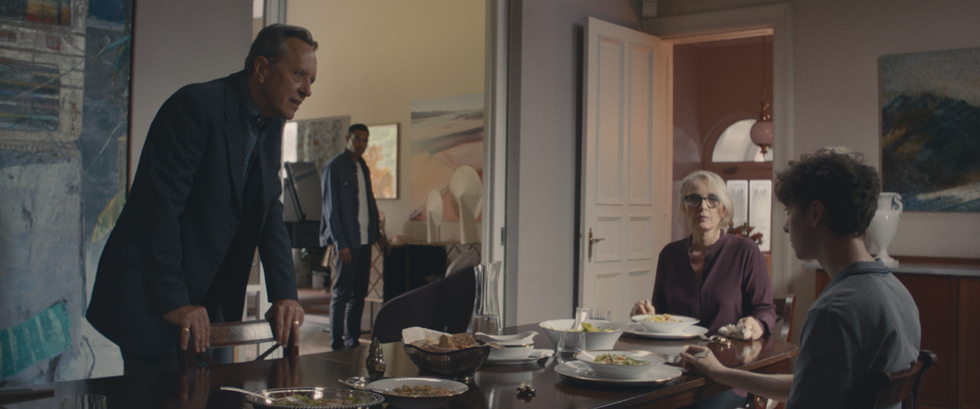
Daryl McCormack in The Lesson
via Bleecker Street
Spoiler alert: This review contains spoilers for the film The Lesson
A friend — another writer, because we masochists have to stick together — tells me she’s not worried about her novel. This is a different tune than she’d been singing all year as she works on this mammoth project that every writer dreads, yet flirts with: writing her first book.
What’s changed? I ask. Turns out — she tells me — all the writers she’s researched say the same thing: you’re doomed to write a bad book in your twenties, then either bury it and never look at it again or completely rewrite it years later. But the bad first novel is crucial. It means you’ve had the discipline face the screen for months, even years. It means you’ve written a book. But a bad first novel removes the agony of showing it to anyone.
Of course, there are exceptions. But for most writers, the first book won’t be a masterpiece. It’s a jumping-off point — a dock at the edge of a pond.
This is what Liam Sommers (played by Daryl McCormack, who received a BAFTA nomination for Good Luck to You, Leo Grande) learns in The Lesson. At one point Liam rips up his first novel and hurls it to the bottom of a pond — and that’s not even the film’s climax.
What is The Lesson about?
The Lesson follows Liam during a formative summer. He’s just graduated from Oxford University, he’s hired by his favorite writer — J.M. Sinclair (Richard E. Grant) — to tutor his son, Bertie (Stephen McMillan).
Liam gets a front-row seat to their family drama, learning what makes everyone tick, and what not to mention. He’s even invited into his hero’s inner literary sanctum. Of course, this is where it all begins to unravel.
THE LESSON | Official Trailer | Bleecker Streetwww.youtube.com
What happens in The Lesson?
Liam soon finds himself embroiled with each family member. He becomes Bertie’s confidant and Mr. Sinclair’s editor. And, later, Mrs. Sinclair (Julie Delpy) — known only to Liam as Hélène — becomes Liam’s lover. As he swept up in the middle of the Sinclairs’ lives, he finds a renewed passion for his own project: his own first novel that he had previously abandoned and, by the middle of the film, finally finishes.
The Lesson is a tale about writers writing, and the agony of it — not merely the act of scribbling on a page (Liam writes longhand, of course) but the tenuousness of your art being perceived — especially by those you idolize. Liam confronts these fears when he shares his novel with Sinclair. It’s then he discovers these fears of the nascent author are what killed Sinclair’s eldest son.
We learn, as Liam learns, that the eldest Sinclair boy, Felix, had also aspired to be a writer. And his father’s ceaseless criticisms were the likely cause of his suicide in the family’s pond. As the summer goes on, Liam fits into the family almost as if he’s their lost son — there’s a scene where Liam borrows some of Felix’s old clothes.
Playing this role of pseudo-son, the story takes on an Oedipal framework as Liam grows disillusioned by Sinclair, as a writer, a father, and as Hélène’s lover and partner.

Is The Lesson good?
Like the Oedipal myth, much of this film relies on oft-used literary tropes to spring conflict upon the cast rather than building tension and character. Instead, much of the film is spent admiring the elegant manor and the beautiful countryside and yearning — just like Liam — to go for a swim in the old pond.
The final third features much of the conflict — and the majority of action — which makes the film feel unevenly paced. As a viewer, you wish there was less fluff and distraction. Considering Bertie’s lack of development — beyond the stereotypical sullen teenage — the relationship between Liam and Hélène feels especially trite. Viewers aren’t privilege Bertie’s own motives — the film only reveals Bertie as his father views him: a boy unable to get out from under his brother’s shadow.
Liam’s character is similarly hard to parse, as he’s caught between the role of participant and observer. As a novelist, you’d think the film would give him a wider perspective. We understand that he’s a Sinclair fanboy, he’s obsessed with rewatching Sinclair’s speeches in the opening scenes, and he even wrote his thesis on Sinclair. And we understand that he is a writer, talented, too. Other questions are raised but not answered: how did he become a tutor? What does he want from life?
The ending feels neat and wrapped up. But a more satisfying ending would be one in which we better understand our protagonist — did he achieve what he set out to do? Was it worth it? Or is he destined to repeat the sins of his pseudo-father?
With greater insight into Liam’s internal motivations, the film would overcome and surpass cliches. However, it’s the world-class performances by both McCormack and Grant that transcend these drawbacks and make the battles of this pretentious pair captivating. All I wanted was more.













